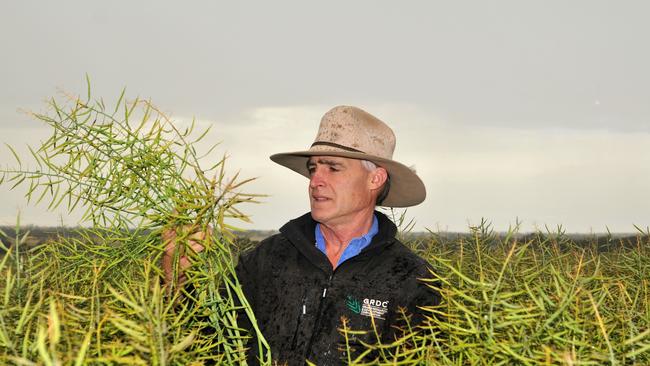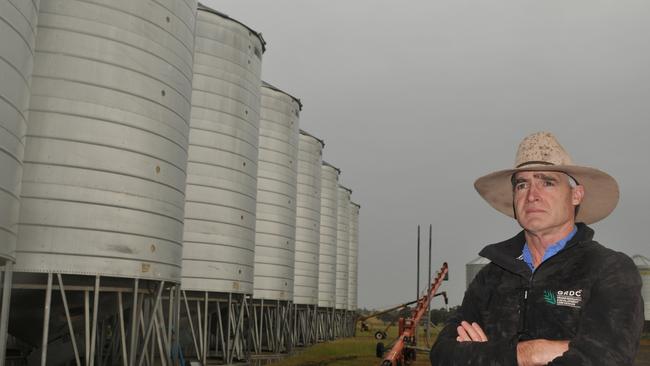Wimmera farming family mixes crops and ewes to great success
John Bennett runs a successful cropping and sheep operation near Horsham. See how he makes his enterprise profitable and mitigates risk.
Risk mitigation for the Bennett family involves mixing districts, crop types and even enterprises.
It’s a formula that means rain at any time is welcomed even if it’s detrimental to one of the moving parts in an operation based across the Wimmera.
John Bennett, wife Allison Bourchier and children Hamish and Sophie have their home base at Lawloit but also have country north of Horsham and more at Wallaloo East, 180km away.
The most recent purchase of the Wallaloo East country a couple of years ago was a calculated decision based on value for money, but also the ability to spread risk outside of their own district.

It goes against farmer thinking that the perfect expansion proposition is buying the place next door, or even one that is a short tractor drive away. And while sharing gear across properties two hours away is not always logistically simple, John never sacrifices timeliness so he can do the job with his own gear.
“Timing is everything and while the seasons are a little different across the two properties, we are comfortable and do use contractors when things need to be done at the same time,” he said.
“We are happy to use contractors for sowing or spraying or harvesting and are not scared to get help.”
It’s a neat solution for the expanding operation, which has grown since John and Allison’s children joined the business.
The mixed farming sees John and son Hamish work mainly in the cropping enterprise, while Allison and Sophie manage the 4500 Merino ewes, a portion of which are joined back to Merinos while the others are joined to terminal sires.
They have always run livestock in their operation despite the trend in the 1990s for many to go to continuous cropping.
The key, John said, to making mixed farming work, was to have a management calendar where there were as few clashes as possible for tasks.
“We run a simple flock, in a simple operation, that we work on when needed but a flock that does not require much input when we are busy on cropping,” he said.
FINDING BALANCE
Stock have also been a valued part of the balance sheet in years with frosted crops and for grazing resistant weeds and will have an ongoing role in the Bennetts’ business.
And while summer rain might not be welcomed by Allison and Sophie in terms of damaging stubbles or dry pastures for feed for the sheep, it’s a big asset for the cropping side, boosting soil moisture.
“On our new property, we had 100-200mm of rain over summer which really set up the year for cropping,” John said.
“Yes, summer rain will decrease feed quality but the trade off is it is good for the cropping.”
So regardless of when rain falls, it’s either good for stock or good for crops with one enterprise bound to sing.

Each year, the Bennetts farm about 5000 hectares across their three properties, with the breakdown this year seeing 25 per cent sown to canola, 25 per cent to wheat, 15 per cent to barley and the remainder to faba beans, lentils, and oats.
The ranges of crop types, which also includes pastures, is another risk-mitigation strategy which not only ensures a healthy crop rotation but also a broader sowing, harvesting, and marketing window.
“We have a range of soil types especially on our farm at Lawloit, ranging from sand to Wimmera cracking clays,” John said. “It allows us to grow that range of crops.”
HARD DECISIONS
When the Bennetts bought the Wallaloo East property, the first thing they did was to soil test the whole area and added gypsum and lime at variable rates to correct any deficiencies.
And while fertiliser prices may be surging, John said they would continue to feed the soil if next year’s rain prospects looked strong.
He’s hopeful the key input may come down in price as it has done in the past but said there were some different factors this time including the supply being constrained by freight issues.
“We will certainly be doing our figures and yet, at the same time, we will give the crops what they need in terms of fertiliser and nitrogen,” John said.
“Some of those who might have had a strong fertiliser history on their properties may be able to back off a little, but when you are spending money on other inputs, you want to maximise production.
“There will be hard decisions being made around kitchen tables and in offices in the next few months but for us, we won’t enjoy it but hope that the good prices from this year’s crop will offset the rates we might have to pay.
“Nitrogen, for example, has been the key to driving up our canola crop yields so we will be giving our crops the nutrients they require.”
TEAM SUPPORT
But that’s not to say that there won’t be a thorough process go into the decisions around the crops, something that John said involved the whole family.
“The hallmark of a good business is a good team, and we like to make sure we have a good team around us, in terms of accountants and agronomists and our great staff which are a critical part of a business,” he said.
“We do rely on good advice, and it is only expensive if it is not right.”
Right now, the Bennetts are looking at what could potentially be one of the best years they have clocked from their combined enterprises.
While the crops had a late start, there’s been a wet winter and a soft spring, and now they will watch the skies carefully to get their high yielding crops into the bin.
“In the past decade, we’ve had six really good years so the 10-year average would be higher than it previously has been,” John said. “But we would be hoping that our wheat will yield four tonnes a hectare and our canola two to three tonnes a hectare.”
John said they had no regrets from looking outside their own district to expand their operation.
“We like to see a bit of different country, and I think that the trend now when you expand is to not necessarily just buy in your own area or one down the road,” he said.




